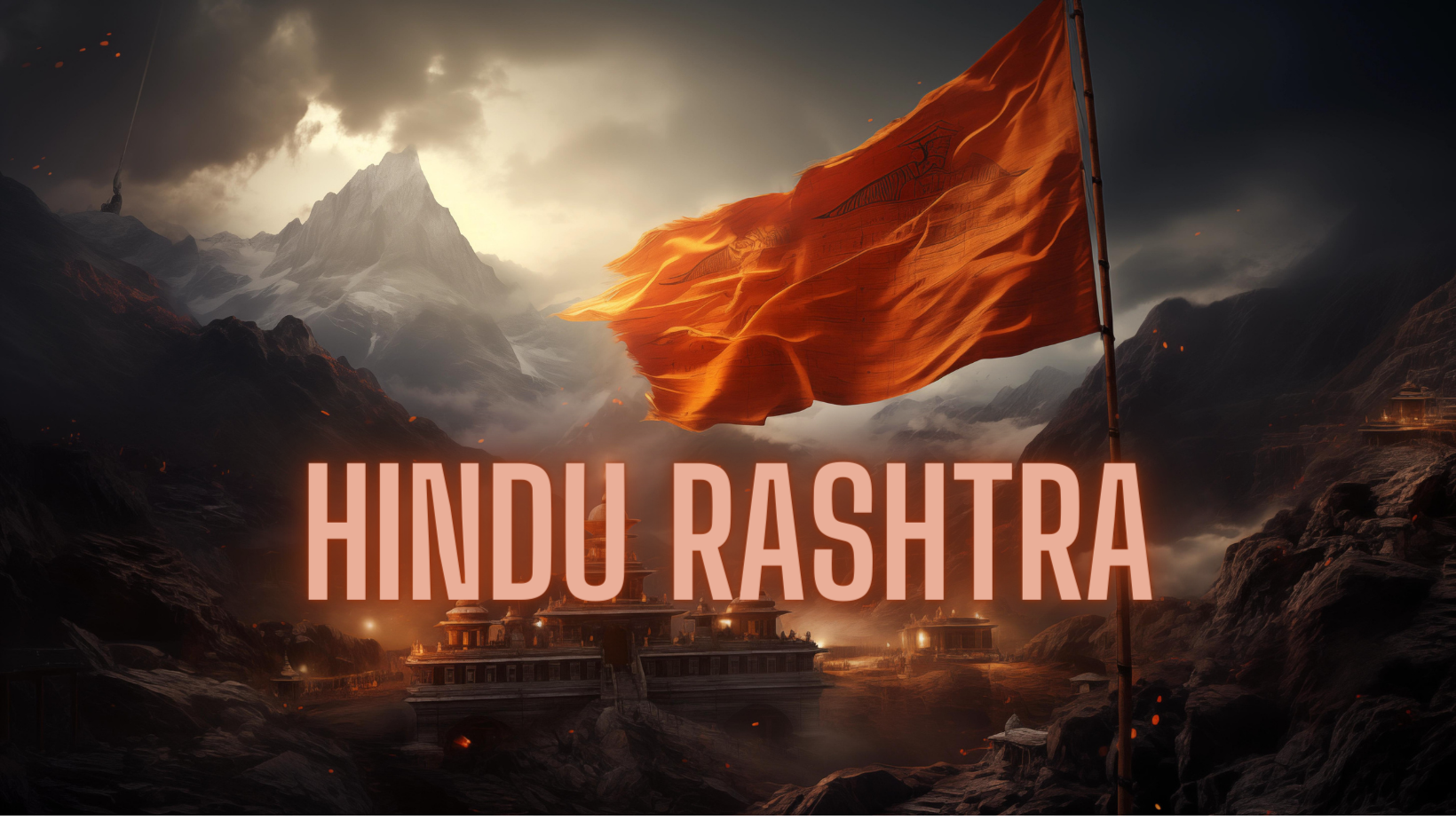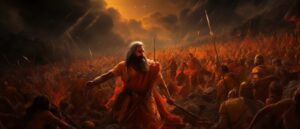Hindu Rashtra
Embarking on a pilgrimage to Mecca, the Shahi Imam of Jama in Delhi encountered an unexpected query from a local resident.
The resident asked, “Are you a Hindu?”
This question caught the Imam off guard, prompting a swift response,
“No, I am a Muslim.” Perplexed, Imam Saheb sought an explanation for being labeled a Hindu.
The resident clarified that in Mecca, everyone from Hindustan was commonly referred to as Hindu. This intriguing exchange sets the stage for a deeper exploration of identity and its nuanced connotations
Hindu Identity: Unveiling Its Essence
Sir Syed Ahmed, the visionary founder of Aligarh University, shed light on the essence of the term “Hindu” during a momentous event in Indian Association Lahore on February 3, 1884.
In his profound words, he articulated that the notion of a nation shouldn’t be confined to religious beliefs. Regardless of being Hindus or Mussalmans, we, as inhabitants of this soil, share a common foundation, experiences of sustenance, and the pursuit of prosperity.
Sir Syed Ahmed envisioned a unified entity, bringing together Hindus and Mussalmans under the umbrella of the “Hindu Nation.”
Importantly, he emphasized that being Hindu transcends religious boundaries – it encompasses all sections, including Mussalmans and Christians.
In a fascinating encounter, a Frenchman once asked an Indian about his religion.
The reply, “Hindu,” prompted the Frenchman to pose a thought-provoking question:
“That is your nationality, but what is your religion?”
This interchange highlights a universal understanding that “Hindu” extends beyond a religious identity; it signifies the nationality of the land.
Even eminent historian Arnold Toynbee, in his monumental work A Study of History, consistently employs the term “Hindu” to denote the rich tapestry of race, society, and civilization that has flourished on this land over millennia. The term resonates not just with Indians but echoes across borders, dispelling any doubt that “Hindu” conveys the very nationality of this diverse and culturally rich land.
Hindu: Inhabitants of Bharat
Becoming a Hindu isn’t bound by religious labels but is a testament to one’s connection with the land of Bharat. Regardless of whether one follows Shaiva, Shakta, Vaishnava, Sikh, Jain, Muslim, Christian, Parsi, Buddhist, or Jewish beliefs, anyone who calls this nation their own is considered a Hindu.
Justice M.C. Chagla emphasizes the French perspective that all Indians, irrespective of caste or community, are Hindus—a fitting description for those who make this land their home.
In essence, we are all Hindus, embracing diverse faiths while sharing a common heritage.
Chagla envisions a triumph for secularism if we collectively adopt the term “Hindus by race.”
In support of this idea, Archbishop Joseph Cardinal Parecattil of Ernakulam acknowledges the Church’s need to draw cultural nourishment from the rich resources of Hinduism.
A passionate advocate for the Indianization of the Church, the Archbishop encourages Indians, including Christians and Muslims, to embrace the national culture rooted in the soil.
This call for unity transcends religious boundaries, emphasizing the shared cultural tapestry that binds all inhabitants of this diverse and ancient land.
The Controversy of Hindu Rashtra
In the tumultuous landscape of Indian politics, the notion of Hindu Rashtra sparks heated debates, with some labeling it as rank communalism and a grave threat to secularism.
The motives behind such assertions are undoubtedly entwined with political considerations.
On one front, Lok Nayak Jayaprakash Narayan envisions a unified nation, stretching across borders to include Bangladesh and Pakistan, emphasizing a shared Bhartiya nationality.
Conversely, the Deputy Speaker of the West Bengal Assembly, Sri Kalimuddin Shams, posits the idea that Muslims constitute a separate nation within the country.
These conflicting pronouncements contribute to widespread misunderstanding and confusion regarding key concepts like nation, state, Hindu, and secularism.
The cacophony created by political leaders, seemingly focused on securing votes and preserving their power, inflicts serious damage on our national unity, mutual goodwill, and the collective will to work together.
Amidst this political theater, those genuinely committed to the nation’s holistic progress find themselves compelled to delve deep into these questions.
Without clarity of ideas and a unified goal, the nation’s onward march risks faltering, slowing down, or, worse, going astray.
Hindu Rashtra as a nation
At the heart of the debate on Hindu Rashtra lies a fundamental question:
What defines a nation or Rashtra?
Scholars unanimously agree that a collective of individuals embracing the identity of a nation should be fueled by a profound sense of “we-ness” – a shared identity and connection that distinguishes them from others.
A Japanese university student’s response to Edward de Cruz sheds light on this concept.
When asked about the Japanese people’s affinity to the East or West in their lifestyle, habits, and beliefs, the student asserted, “We are like neither the East nor the West
. We are simply Japanese.” In our rapidly changing world, where the lines between East and West blur, the Japanese find their strength in adhering to specific beliefs and traditions that preserve their Japanese essence.
Despite facing various challenges, they remain unwavering in their Japanese character.
This declaration by the student underscores a universal truth about true nationhood – a deep-rooted awareness of one’s identity, irrespective of external influences.
The commitment to preserving this identity becomes crucial for nations to play impactful roles in the global arena. Whether it’s the Japanese-ness of the Japanese, the Egyptian-ness of the Egyptians, the German-ness of the Germans, or the English-ness of the English, the creation of this distinct identity forms the bedrock of their collective “we-ness.”
The question that naturally arises is:
How is this sense of Japanese-ness, German-ness, Egyptian-ness, or English-ness forged? How does the feeling of nationhood evolve?
The Evolutionary Dance of Nations
Human existence is inherently social; individuals need cooperative groups or communities to meet their diverse needs. In the early stages of human evolution, small groups sufficed for protection and sustenance, akin to an enlarged family or tribe.
However, as humans transitioned from nomadic to settled lifestyles through agriculture, a profound connection with the life-sustaining earth emerged – the dawn of nationalism.
With the advancement of civilization, human needs expanded, prompting the formation of more extensive communities.
Tribes converged, fostering mutual cooperation and giving rise to larger societal structures. Simultaneously, individuals addressing intellectual, mental, and spiritual needs became integral to these collective entities.
In this evolution, figures like Shakespeare and Shaw in Britain, Goethe and Schopenhauer in Germany, Rousseau and Voltaire in France, Tolstoy and Gorky in Russia, and Valmiki and Kalidasa in Bharat became as indispensable to civilized life as the essentials of food, clothing, and shelter.
The geographical expanse required for the comprehensive development of a community, steeped in a sense of “we-ness,” delineates the natural boundaries of a country.
This connection extends beyond mere emotional attachment; the land imparts a distinct characteristic to the community’s life, civilization, and culture.
Sydney Herbert aptly notes that the foundation of any nationality is rooted in the homeland, where a continuous communal life shapes its basis.
The sentiment of nationality finds its most profound expression in the enduring passion of its members for their national homeland. Nationality, as a concept, necessitates a defined territory – the national homeland – where traditions, historical associations, language, literature, culture, and religion converge to form the unique identity of a nationality.
Hindu Nationalism
The potency of national sentiment becomes evident when we observe the limitations of global ideologies such as Islam, Christianity, and Communism.
Despite their aspirations to unite the world under a single banner by discarding national boundaries, these ideologies have failed to eradicate the appeal of nationalism. Instead, they themselves have splintered into various national manifestations. Presently, Islam varies significantly in Turkey, Egypt, Iran, or Indonesia, each adopting distinct creeds. Iran, for instance, distinguished itself from Arabs by embracing the Shia sect and incorporated Parsi beliefs through the Sufi sect. Turkey transformed Islam by aligning it with Western civilization, while Indonesian Islam assimilated elements from Bhartiya culture.
Similarly, the dreams of establishing a global dictatorship of the proletariat, as advocated by the “workers of the world unite” slogan, have encountered constraints within national boundaries. Communist proletariats in countries like Russia, China, Vietnam, and Albania are now in conflict, with each regarding its version of Communism as authentic and discrediting others as revisionist, reactionary, or expansionist.
Even within the communist ideology, divisions have emerged, with Italian and French communists rejecting the dictatorship of the proletariat and forming Euro-Communism. Russia, in a significant shift, revised its constitution to abandon the concept of a proletariat state, opting instead for a state belonging to all people.
The once-unified communist tide is now fragmented into numerous factions, shattered against the rock of nationalism.
This reality underscores the supremacy of nationalism, proving to be a more potent and deeply rooted expression of humanity’s evolutionary cycle than religion or language.
Even figures like Stalin, known for deriding God and religion as the opium of the masses, acknowledged the impact of national spirit. In his words,
“Apart from language, territory, and economic life, one must consider the specific spiritual complexion of the people constituting a nation.”
The sentiments of nations differ not only in their conditions of life but also in their unique spiritual characteristics, as reflected in their distinct national cultures.
This view resonates with the perspective of Swami Vivekananda, a profound spiritual luminary, who emphasized that national union in India must unite the scattered spiritual forces, bringing together those whose hearts beat to the same spiritual tune. The enduring power of national sentiment, capable of uniting diverse spiritual forces, highlights its fundamental role in shaping the course of human societies.



